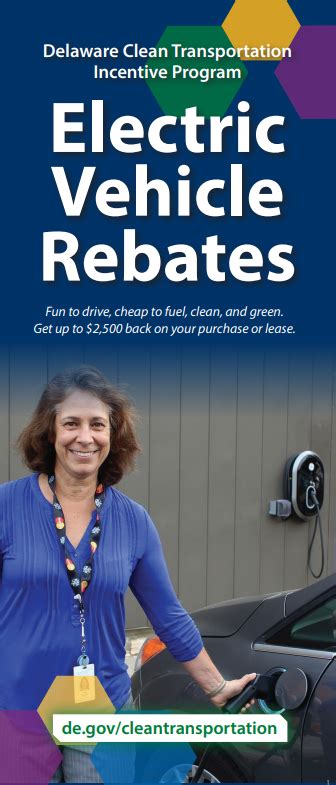Introduction to EV Adoption in Delaware
The transportation sector is one of the biggest contributors to greenhouse gas emissions in the United States. As states take more proactive measures to reduce their carbon footprints, electric vehicles (EVs) have emerged as a sustainable alternative. Delaware, a small state with a commitment to innovation, has launched the Electric Vehicle Rebate Program aimed at promoting the adoption of EVs throughout the state.
The State of Electric Vehicle Adoption
Delaware has been slowly but surely increasing its adoption of electric vehicles. However, several factors have historically hindered this transition, including cost, awareness, and availability of charging infrastructure. The introduction of the Electric Vehicle Rebate Program addresses these challenges head-on, making EVs more accessible and appealing to the average consumer.
The Delaware Electric Vehicle Rebate Program
Established in response to the growing environmental crisis, the Electric Vehicle Rebate Program offers substantial financial incentives to residents who purchase or lease new electric vehicles. The rebates vary depending on the type and model of the vehicle, providing a financial cushion for those looking to make the switch.
For example, residents can receive a rebate up to $3,500 for eligible electric vehicles. Additionally, certain plug-in hybrids are also eligible for rebates, making the initiative even more inclusive. These financial incentives help to offset the initial higher cost of EVs, making them a more viable option for families and individuals.
Benefits of the Program
The benefits of the Electric Vehicle Rebate Program are numerous. Firstly, reducing the cost barrier encourages more residents to consider EVs as a practical choice. Secondly, it enhances awareness about the environmental and economic benefits of electric vehicles, such as lower maintenance costs and reduced dependence on fossil fuels. Moreover, the program contributes to the development of a cleaner environment by promoting the use of zero-emission vehicles.
Empowering consumers with financial incentives also creates a ripple effect. As more people adopt electric vehicles, the demand for charging infrastructure increases, prompting more businesses and municipalities to invest in EV charging stations. This creates a robust ecosystem that supports EV use, making the state more sustainable in the long run.
Charging Infrastructure in Delaware
The success of EV adoption is heavily dependent on the availability of charging stations. To complement its Electric Vehicle Rebate Program, Delaware has been actively working to expand its EV charging infrastructure. The state has partnered with private companies and municipalities to install more publicly accessible charging stations, making it convenient for EV owners to charge their vehicles.
In addition, various initiatives have been launched to educate the public about where to locate these charging stations, thus enhancing consumer confidence in owning an electric vehicle. By developing a comprehensive charging network, Delaware aims to remove one of the most significant barriers to EV adoption—range anxiety.
Impact on Local Economy
The introduction of the Electric Vehicle Rebate Program is not just a win for environmentalists; it also has a positive impact on Delaware’s economy. By encouraging residents to purchase electric vehicles, the program supports local businesses that sell and service these vehicles. This initiative could lead to a new economic sector focused on EV maintenance and infrastructure development, stimulating job creation in the state.
Additionally, the transition to EVs could contribute to energy diversification, as a greater reliance on renewable energy sources for power generation is anticipated. This not only fosters a more resilient economy but also helps reduce energy costs for consumers in the long run.
Conclusion
Delaware’s Electric Vehicle Rebate Program represents a pivotal step toward the adoption of electric vehicles in the state. By reducing financial barriers and expanding charging infrastructure, Delaware is not only making EV ownership more attractive but is also taking a significant stride in combating climate change. This proactive initiative will facilitate a cultural shift towards sustainable transportation, ultimately benefiting the local economy and the environment.
The future looks promising for electric vehicles in Delaware, and as more residents make the switch, the state will continue to pave the way for a more sustainable and eco-friendly future.
FAQs
1. What is the maximum rebate amount available under the Electric Vehicle Rebate Program?
The maximum rebate amount for eligible electric vehicles can be up to $3,500, depending on the vehicle model.
2. Are plug-in hybrids eligible for rebates?
Yes, certain models of plug-in hybrid vehicles are also eligible for rebates under the program.
3. How do I apply for the EV rebate?
Residents can apply for the rebate through the Delaware Division of Energy and Climate’s website, where you will find all the necessary documentation and instructions.
4. Is there a limit on the number of rebates per household?
Currently, there are no restrictions on the number of rebates a household can receive, as long as each EV purchased is eligible.
5. How does the rebate program affect charging infrastructure?
The increase in electric vehicle adoption drives demand for more publicly available charging stations, encouraging investment in EV infrastructure across the state.
Download Delaware Electric Vehicle Rebate
